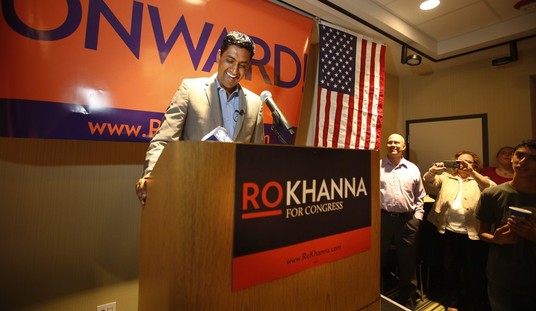Kathryn Jean Lopez looks at the latest analysis from political prognosticator Larry Sabato, who has decided that he has been too conservative in his estimation of the chances for a Republican takeover of the House. The GOP needs a 39-seat switch to retire Nancy Pelosi as Speaker, and until now, Sabato has kept his predictions to the 30-and-under range. Taking into account the nosediving fortunes of Democrats both nationally and in each district, Sabato now sees a likelihood of Republican control of the House:
Given what we can see at this moment, Republicans have a good chance to win the House by picking up as many as 47 seats, net. This is a “net” number since the GOP will probably lose several of its own congressional districts in Delaware, Hawaii, and Louisiana. This estimate, which may be raised or lowered by Election Day, is based on a careful district-by-district analysis, plus electoral modeling based on trends in President Obama’s Gallup job approval rating and the Democratic-versus-Republican congressional generic ballot (discussed later in this essay). If anything, we have been conservative in estimating the probable GOP House gains, if the election were being held today.
Don’t just skip over that cautionary note at the end. Anything can happen in the next few weeks to stall Republican momentum nationwide, or in individual races. The GOP is especially vulnerable to sudden shifts since they have so many fresh faces running for Congress this year, and inexperienced candidates can make mistakes. Activists and organizers need to keep their energy and efforts up.
Assuming that the GOP maintains momentum, Sabato has another interesting point about the history of changes in control of the House:
If the Republican wave on November 2 is as large as some polls are suggesting it may be, then the surprise on election night could be a full GOP takeover. Since World War II, the House of Representatives has flipped parties on six occasions (1946, 1948, 1952, 1954, 1994, and 2006). Every time, the Senate flipped too, even when it had not been predicted to do so. These few examples do not create an iron law of politics, but they do suggest an electoral tendency.
A couple of caveats on that, too. First, the previous Senate flips didn’t require as many seats to change parties as it does this year. Sabato has increased his prediction of net Republican gain in the upper chamber to eight seats, possibly nine. The latter would set up a 50-50 tie, unless Ben Nelson of Nebraska decided to flip and save himself from a Republican challenge in 2012. Also, the GOP has the same exposure to game-changing errors in Senate races from rookies, and much less margin of error in terms of winning control. Republicans will have to nearly run the table to make it happen.
But for the first time, Sabato doesn’t think an outright win for Republicans in the Senate is out of the question. And in this case, history could be on their side.
Update: The Cook Report has also adjusted its outlook for Republicans upward:
At some point in every election cycle, the outlook for the Senate begins to look more like a mathematical equation and less like a collection of individual races. With 61 days to go before the election, we’ve now hit that point. The math equation for the Senate is divided into two parts; the macro political environment, and the 37 races on the ballot this year. The macro political landscape strongly favors Republicans and it is not likely that it will change much between now and November. As a result, a look at the 37 Senate races on the ballot shows some deterioration for Democrats in some of the 19 seats they are defending, while Republicans’ prospects have stayed the same or improved slightly in their most competitive seats. As such, it is now likely that Republicans will score a net gain of between seven and nine seats. While there is a plausible argument for how Republicans could net the 10 seats they need to win the majority, it remains an unlikely scenario today.
That 7-9 range will still be a big win — and don’t forget that Democrats have more seats to defend in 2012 than Republicans.








Join the conversation as a VIP Member